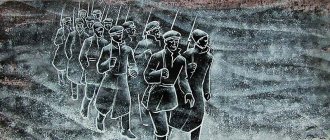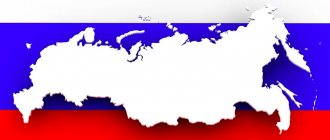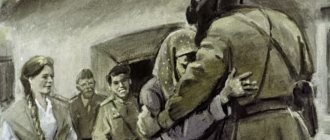The people in the work
This wonderful work, written by the magnificent writer Gogol, contains a story about the life of ordinary people. Also, the author describes in sufficient detail and truthfully the activities of dishonest officials and landowners who tried in every possible way to deceive ordinary people. This makes the work even more vibrant. After all, if you think about the philosophical meaning of this work, you can realize the fact that people who get used to receiving income from the labor of others begin to look for new ways to exploit them. “Dead Souls” are direct proof of how quickly the landowners begin to treat Chichikov’s request as a normal and familiar transaction. On the one hand, this shows their good entrepreneurial ability. And on the other hand, the entire immoral component of these heroes.
The author shows all the horrors of such a phenomenon as serfdom. Indeed, through the prism of this phenomenon, it becomes clear how difficult it was for the peasants to live under such landowners as, for example, Korobochka. She gave money for the purchase not of serfs, but of her own slaves, whom she exploited not only on the farm, but also in any other business. She saw nothing human in the peasants and treated them with disdain. Chichikov's list contains real and kind people who were once involved in hard and exhausting work. The hero feels extremely sorry for these people, and he is shocked by the huge number of names.
The image of Plyushkin showed all the horror and arbitrariness of that time. After all, this hero kept his serfs in incredibly difficult and grueling conditions - he rarely fed them, as a result of which they ran away from him. Also, Chichikov noticed the fact that those people who managed to escape from Plyushkin were already also “non-living” people. After all, he believed that the only chance of survival for a runaway serf was to find a new landowner whom he would serve, or he could face imprisonment, in which the person would most likely die. The serfs in this work were shown as smart, talented and hardworking people who dreamed of changes in the life of their state. However, due to the fact that they could not do anything, they had to endure such cruel treatment of the landowners towards themselves.
Depiction of the people in the poem “Dead Souls”
The “ideological core” of I.V. Gogol’s poem “Dead Souls” is “the thought of the tragic fate of the people.” Throughout the work, the author mentions people of the “low class”. Although such bright characters do not stand out among the images of serf peasants, their diversity reveals the whole picture of serf Russia. Depicting the hard life of the peasantry, showing their hard work, talent, accuracy of speech and their ignorance and darkness - all these qualities help the author reveal different sides of the common people. On the very first page of the poem, Gogol paints us the following picture: two men, clearly not burdened with any business, standing at the door of the tavern, carefully examined and assessed the condition of the wheel on Chichikov’s chaise and, not without knowing the matter, decided that it would only reach Moscow. By this he wanted to show the indifference of these men to matters that do not concern them. In the second chapter, the author introduces us to Petrushka and Selifan, Chichikov’s servants. Petrushka is characterized by three characteristic traits: a passion for reading, sleeping without undressing and carrying a special smell with him everywhere: “it was enough for him to build his bed somewhere and drag his overcoat and belongings there, and it already seemed that people had been living in this room for ten years.” People". Selifan was a somewhat different person, although poorly educated. These two characters personify the ignorance of the people, their darkness. But at the same time, even such people have folk ingenuity: “In decisive moments, a Russian person will find what to do without going into further considerations.” Korobochka’s completely dark and downtrodden yard girl is Pelageya, who “cannot distinguish between left and right.” She walks “with bare feet and in a dress made from home dyeing,” which speaks of the poverty of the peasants of that time. We learn that among the serfs there were artisans from the words of the landowner Sobakevich: “... for me, like a vigorous nut, everything is selected: not an artisan, then some other strong man.” And then he talks about each one separately: carriage maker Mikheev, carpenter Stepan Probka, brickmaker Milushkin, shoemaker Maxim Telyatnikov, merchant Eremey Sorokoplekhin - all of them were skilled craftsmen. The description of their houses also speaks about the hard work of Sobakevich’s peasants: “The village huts of the peasants were also built amazingly: there were no brick walls, carved patterns and other tricks, but everything was fitted tightly and properly.” The author admires the accuracy of the speech of the Russian people: “The Russian people express themselves strongly! .. but there is no word that would be so sweeping, smart, so bursting out from under the very heart, so seething and vibrant, as an aptly spoken Russian word.” It must be said that the poem also pays attention to the popular revolt, which is written about in “The Tale of Captain Kopeikin.” Gogol also does not forget about such a quality of the Russian people as breadth of nature. He talks about him in a lyrical digression about a bird-three. Gogol’s description of contemporary Russia cannot be imagined without serfdom, therefore the fate of the people occupies one of the main places in the poem. The author loves simple peasants - the salt of the Russian soil.
The people in Gogol's poem "Dead Souls"
Russia in Gogol's time was ruled by landowners and officials similar to the heroes of Dead Souls.
It is clear in what position the people, the serf peasantry, had to be. Following Chichikov on his journey from one landowner's estate to another, we observe a bleak picture of the life of the serf peasantry: their lot is poverty, disease, hunger, and terrible mortality. The landowners treat the peasants as their slaves: they sell them individually, without families; dispose of them like things. “Perhaps I’ll give you a girl,” Korobochka says to Chichikov, “she knows the way, just watch!” Don’t bring it, the merchants have already brought one from me.” In the seventh chapter, Chichikov reflects on the list of peasants he bought. And before us is revealed a picture of the life and back-breaking work of the people, their patience and courage, violent outbursts of protest. Particularly attractive are the images of Stepan Probka, endowed with heroic strength, a remarkable carpenter-builder, and Uncle Micah, who meekly replaced the murdered Stepan in his dangerous work. In the soul of the enslaved peasantry there lives a desire for freedom. When the peasants can no longer endure serfdom, they run away from the landowners. True, flight did not always lead to freedom. Gogol tells the ordinary life of a fugitive: life without a passport, without work, almost always arrest, prison. But Plyushkin’s servant Popov still preferred life in prison to returning under the yoke of his master. Abakum Fyrov, escaping serfdom, went into barge hauling. Gogol also talks about cases of mass indignation. 'The episode of the murder of assessor Drobyazhkin shows the struggle of the serf peasantry against their oppressors. The great realist writer, Gogol, figuratively speaks about the downtroddenness of the people: “The police captain, even if you don’t go yourself, but only send one cap to your place, then this one cap will drive the peasants to their very place of residence.” In a country where the peasants were ruled by cruel and ignorant little boxes, Nozdryovs and Dogevichs, it was not surprising to meet the stupid Uncle Mitya and Uncle Minya, and the courtyard Pelageya, who did not know where the right side was and where the left side was. But Gogol sees at the same time the mighty power of the people, suppressed, but not killed by serfdom. It is manifested in the talent of Mikheev, Stepan Probka, Milushkin, in the hard work and energy of the Russian person, in his ability not to lose heart under any circumstances. “Russian people are capable of anything and get used to any climate. Send him to Kamchatka, just give him warm mittens, he claps his hands, an ax in his hands, and goes to cut himself a new hut,” say officials, discussing the resettlement of Chichikov’s peasants to the Kherson province. Gogol also speaks about the high qualities of the Russian person in his remarks about the “lively people”, about the “efficient Yaroslavl peasant”, about the remarkable ability of the Russian people to aptly characterize a person in one word. Thus, depicting feudal-serf Rus', Gogol showed not only landowner-bureaucratic Russia, but also people’s Russia, with its persistent and freedom-loving people. He expressed his faith in the living, creative forces of the working masses. A vivid image of the Russian people is given by the writer in his famous likening of Russia to a “three bird”, personifying the essence of the national Russian character. The image of the people in the poem “Dead Souls”
The poem “Dead Souls” in the works of N.V. Gogol occupies a special place. Gogol’s global plan is to show all of Russia in cross-section, all its vices and shortcomings.
The majority of the population of Russia at that time were peasants. In the poem, their world is described very figuratively. In my opinion, it is divided into several components. Every landowner always has a little world of peasants that belongs to him and characterizes him. The peasants themselves are not described, but we can judge them by their homes. At Manilov’s, for example, “gray log huts darkened length and breadth.” Korobochka already had other huts, “which, although they were built scattered, but, according to a remark made by Chichikov, showed the contentment of the inhabitants.” Sobakevich’s peasant lands do not cause surprise - we see them as we expected to see them - “poorly tailored, but tightly sewn.” The huts of Plyushkin's peasants, like himself, are shown to be old, dilapidated, and practically unnecessary.
In addition to the little worlds of the peasants, in my opinion, there are other little worlds. The first is an allegorical world of peasants who died or fled from their landowners, very different from all the others, which is mentioned only occasionally. Also on the pages of the poem we feel the presence of another one - the so-called “central” world of peasants, presented in specific situations.
The strangest and most incomprehensible for us is probably the world of dead or fled peasants. Its inhabitants are, as it were, opposed to the population of the world of the “living”. With the help of this technique, Gogol manages to emphasize the poverty of the morals of the main characters. After Sobakevich’s excessively boastful speech describing his dead peasants, he himself, cunning and selfish, descends in our eyes to several levels at once. But the peasants are the property of the landowner, skilled, spiritually rich people were forced to meekly submit to a man with the life principles of a tradesman. The following reminders about this world show us it from a completely different side. It appears to us as the “world of the living” who have left the “world of the dead”.
The so-called central world requires special attention. He imperceptibly joins the narrative at the very beginning of the poem, but its plot line does not often come into contact with it. At first it is almost invisible, but then, along with the development of the plot, the description of this world is revealed. At the end of the first volume, the description turns into the anthem of all Rus'. Gogol figuratively compares Rus' “with a brisk and irresistible troika” rushing forward. Throughout the entire narrative, the writer extols the peasants, who constitute the main, most active and useful part of this world, through contrast with the deliberately humiliated landowners, officials, and employees. The description of this world begins with a conversation between two peasant craftsmen discussing the technical capabilities of a crew entering the city of NN. On the one hand, their conversation smacks of idleness; one feels its incompleteness and uselessness. But, on the other hand, both of them showed a fairly high level of knowledge of the structure and capabilities of the crew. These two characters, in my opinion, are expressionless and are shown more on the negative side than on the positive side. They appear at the very beginning of the work and, as it were, introduce us to the world of the poem. The next colorful representatives of the “central” world shown in the poem are two men who showed Chichikov the way to Manilovka. They know the territory well, but their speech is still lame. The most colorful character among the peasants, in my opinion, is the one we saw when he was dragging “a very thick log ... like a tireless ant, to his hut.” He expresses the whole sweeping nature of the Russian person. Gogol emphasizes this by speaking through his lips “an aptly spoken Russian word.”
The most striking expression of the writer’s patriotic feelings in the poem is his discussion of the fate of Rus'. Comparing her “immense expanses” with the innumerable spiritual riches of her people, Gogol sings an ode of praise to her:
“Isn’t it here, in you, that a boundless thought will be born, when you yourself are endless? Shouldn't a hero be here when there is room for him to turn around and walk? And a mighty space envelops me menacingly, reflecting with terrible force in the depths of my soul; My eyes lit up with unnatural power: oh! What a sparkling, wonderful, unknown distance to the earth! - Rus!"
Russia in Gogol's time was ruled by landowners and officials similar to the heroes of Dead Souls. It is clear in what position the people, the serf peasantry, had to be. Following Chichikov on his journey from one landowner's estate to another, we observe a bleak picture of the life of the serf peasantry: their lot is poverty, disease, hunger, and terrible mortality. The landowners treat the peasants as their slaves: they sell them individually, without families; dispose of them like things. “Perhaps I’ll give you a girl,” Korobochka says to Chichikov, “she knows the way, just watch!” Don’t bring it, the merchants have already brought one from me.” In the seventh chapter, Chichikov reflects on the list of peasants he bought. And before us is revealed a picture of the life and back-breaking work of the people, their patience and courage, violent outbursts of protest. Particularly attractive are the images of Stepan Probka, endowed with heroic strength, a remarkable carpenter-builder, and Uncle Micah, who meekly replaced the murdered Stepan in his dangerous work. In the soul of the enslaved peasantry there lives a desire for freedom. When the peasants can no longer endure serfdom, they run away from the landowners. True, flight did not always lead to freedom. Gogol tells the ordinary life of a fugitive: life without a passport, without work, almost always arrest, prison. But Plyushkin’s servant Popov still preferred life in prison to returning under the yoke of his master. Abakum Fyrov, escaping serfdom, went into barge hauling. Gogol also talks about cases of mass indignation. The episode of the murder of assessor Drobyazhkin shows the struggle of the serf peasantry against their oppressors. The great realist writer, Gogol, figuratively speaks about the downtroddenness of the people: “The police captain, even if you don’t go yourself, but only send one cap to your place, then this one cap will drive the peasants to their very place of residence.” In a country where the peasants were ruled by cruel and ignorant little boxes, Nozdryovs and Dogevichs, it was not surprising to meet the stupid Uncle Mitya and Uncle Minya, and the courtyard Pelageya, who did not know where the right side was and where the left side was. But Gogol sees at the same time the mighty power of the people, suppressed, but not killed by serfdom. It is manifested in the talent of Mikheev, Stepan Probka, Milushkin, in the hard work and energy of the Russian person, in his ability not to lose heart under any circumstances. “Russian people are capable of anything and get used to any climate. Send him to Kamchatka, just give him warm mittens, he claps his hands, an ax in his hands, and goes to cut himself a new hut,” say officials, discussing the resettlement of Chichikov’s peasants to the Kherson province. Gogol also speaks about the high qualities of the Russian person in his remarks about the “lively people”, about the “efficient Yaroslavl peasant”, about the remarkable ability of the Russian people to aptly characterize a person in one word. Thus, depicting feudal-serf Rus', Gogol showed not only landowner-bureaucratic Russia, but also people’s Russia, with its persistent and freedom-loving people. He expressed his faith in the living, creative forces of the working masses. A vivid image of the Russian people is given by the writer in his famous likening of Russia to a “three bird”, personifying the essence of the national Russian character.
In Gogol's poem “Dead Souls” the theme of the people occupies one of the leading places. During Gogol’s time, Russia was ruled by landowners and officials, “obsequious slaves of power and ruthless tyrants of their slaves, drinking the life and blood of the people” (as Herzen aptly described it). The author shows a bleak picture of the life of the serf peasantry. The landowners ruthlessly exploit them, treat them as their slaves, and can buy and sell them like things. The “club-headed” Korobochka, afraid of selling dead souls too cheaply, complains to the guest: “...it has never happened to me to sell the dead. I gave up the living ones, so the archpriest gave two girls for a hundred rubles each...” Peasants are obliged to fulfill all the whims of their masters. Before going to bed, Korobochka asks Chichikov: “Perhaps, my father, you are used to having someone scratch your heels at night? My deceased could not fall asleep without this.” Nozdryov’s “breadth of nature” has a detrimental effect, first of all, on the serfs. Their work is devalued. Everything that was grown by the labor and sweat of the peasants and sold at the fair “at the best price” was sold by the landowner in a few days. He proudly tells Chichikov about this: “Congratulations: he’s blown away!” The author presents a terrifying picture of the life and back-breaking work of the people, their patience and courage, outbursts of protest, while Chichikov is reflecting on the list of dead souls he acquired. Reading the names of the peasants, the hero, sighing, said: “My fathers, how many of you are crammed here! What have you, my dear ones, done in your lifetime? How did you get by?” The image of the carpenter Stepan Probka, endowed with heroic strength, who probably walked all over the province with an ax in his belt, attracts attention. No less interesting is the image of shoemaker Maxim Telyatnikov, who studied with a German and was unable to organize his own business. Apparently he had become an alcoholic and was lying drunk on the street, saying: “No, it’s bad in the world! There is no life for the Russian people, all the Germans are in the way.” Grigory You get there, you won't get there, he lived as a driver, renounced his home and gave his soul to God somewhere on the road. In the soul of an enslaved people there lives a desire for freedom. On Plyushkin’s estate, the peasants, reduced to extreme poverty, are “dying like flies” and fleeing from the landowner. Looking at the list of fugitives, Chichikov concludes: “Even though you’re still alive, what’s the use of you! The same as the dead... are you sitting in prisons or are you stuck with other masters and plowing the land?” Plyushkin's yard servant Popov prefers life in prison to returning to his master's estate. Abakum Fyrov has gone to barge haulers and is dragging his feet to a mournful song. Gogol also talks about cases of mass indignation of peasants against their oppressors. This is clearly shown in the episodes of the murder of assessor Drobyazhkin. At the same time, Gogol also sees the mighty power of the people, suppressed, but not killed by serfdom. It is manifested in the talent, hard work, energy of the Russian person, in his ability not to lose heart under any circumstances. Discussing the resettlement of peasants bought by Chichikov to the Kherson province, officials say: “Russian people are capable of everything and get used to any climate. Send him to Kamchatka, just give him warm mittens, he claps his hands, an ax in his hands, and goes to cut himself a new hut.” In one of his lyrical digressions, Gogol speaks about the accuracy and expressiveness of the Russian word, about the “living and lively Russian mind.” Gogol in his poem showed Rus' with its hardworking and persistent people, in whom inexhaustible strength is hidden, and expressed faith in the bright future of the people and homeland.
The topic that the author raises expands from page to page. Buying dead souls becomes a description of the life of the peasantry. The people in the poem “Dead Souls” stand out for their diversity, talent, kindness and insane desire to live.




